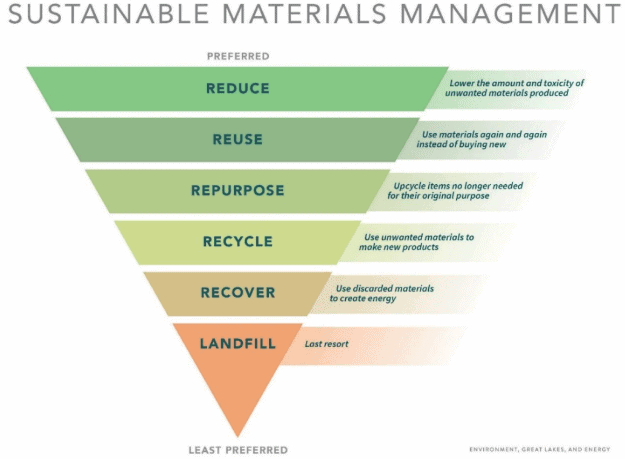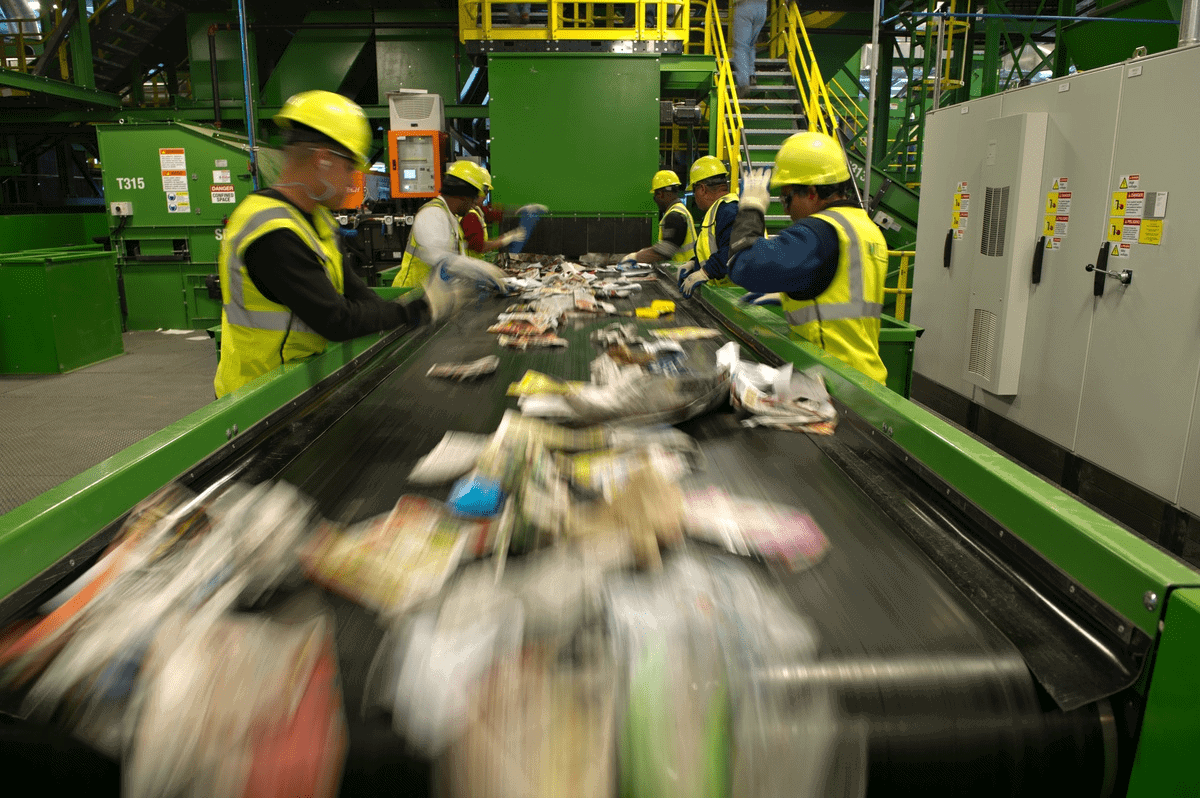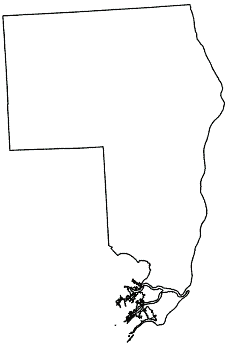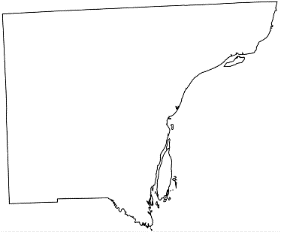The question of how to safely and sustainably manage the waste products we generate has always been vexing. How do we properly dispose of garbage, recycling, and organic waste like food scraps? How do we reduce our overall waste and material generation? If we can’t reduce it, how can we reintroduce those materials into the economy to keep waste generation down? The Michigan Department of Environment, Great Lakes, and Energy (EGLE) is considering a coordinated statewide approach to develop the plans that answer these questions. This process, including planning, funding, implementation, and evaluation, is referred to as materials management.
What is Materials Management?
Materials Management Planning (MMP) is a revised approach to solid waste management that considers all “managed materials,” which includes solid and hazardous waste, as well as recycled and upcycled materials. The materials management framework of a given community will include a number of waste haulers, curbside pickup, drop-off, compost, landfill, material recovery, and waste-to-energy facilities within the normal fold of waste management, as well as the “circular economy” that uses recycled and upcycled materials, and initiatives the reduce waste generation altogether.
The term “materials” is used because it is much more holistic in considering all of the elements that go into solid waste management, especially as the term “waste” implies that these materials can never be reused or repurposed. EGLE developed a Sustainable Materials Management pyramid that lists the methods of materials management; the methods are listed below in order of most preferred to least preferred:
- Reduce: Lower the amount and toxicity of unwanted materials produced
- Reuse: Use materials again and again instead of buying new
- Repurpose: Upcycle items no longer needed for their original purpose
- Recycle: Use unwanted materials to make new products
- Recover: Use discarded materials to generate energy
- Landfill: Last resort

How is Materials Management Regulated Compared to Solid Waste?
Part 115 of the Michigan Natural Resources and Environmental Protection Act (Act 451 of 1994) entails the regulations for solid waste and materials management in Michigan. Generally speaking, there are a few issue areas managed under Part 115:
- Regulating where and how solid waste is managed and disposed.
- Outlining of the requirements for counties to adopt a solid waste management plan (SWMP) to regulate how solid waste is treated in the county jurisdiction.
- Identifying the type of processing and landfill facilities, including resource recovery and materials recovery facilities (RRFs and MRFs).
- Requiring that new construction and modifications to facilities are compliant with the adopted SWMP in a jurisdiction
As of December 2022, materials management has been codified into law within Public Act 250 of 2022. This amendment provides regulations for each county to adopt a Materials Management Plan that describes a more holistic approach to solid waste including recycling, upcycling, reuse, and reduction programs. In addition, the law would require the formation of a Planning Committee for the area designated under an MMP.
The members of this Planning Committee needs to include:
- A representative from a solid waste disposal facility serving the planning area;
- A representative from a hauler serving the planning area;
- A representative from an MRF operator serving the planning area;
- A representative from a composting or anaerobic digester facility serving the planning area;
- A representative from a waste diversion, reuse, or reduction facility operator serving the planning area;
- A representative from an environmental interest group that has members residing in the planning area
- An elected official of the county in the planning area;
- An elected official of a township in the planning area;
- An elected official of a city or village in the planning area;
- A representative of a business generating a managed material; and
- A representative of the regional planning agency whose territory includes the planning area.
Multi-county committees need to include an elected official from each county and an MM-generating business representative in each county.
The plan is also required to have a measurable target and implementation frameworks. These apply to different managed materials, including organics and recyclables. The passage of an MMP not only reflects current materials management practices but also aligns with Michigan’s MI Healthy Climate Plan that was adopted in April 2022. The plan recognizes materials management both as a step toward decarbonization and as an approach to clean, environmentally sound economic development.

Materials Management County Engagement (MMCE) Grant and SEMCOG’s Approach
A primary focus of materials management is not only the revised methodologies and implementation. Another major component is regionalism: managed materials have no boundaries. Whether they are being repurposed or recycled, landfilled, or transferred, these materials will ultimately cross municipal and county lines to reach their destinations. Regional cooperation is an important operation to make sure all aspects of materials management and the cyclical economy are mutually understood and beneficial to partners at governmental, nonprofit, and private levels.
To assess current conditions and plans, measure the impacts of P.A. 250 on current and future efforts, and establish coordinating relationships, EGLE developed the MMCE Grant Program. This grant provides $10,000 to individual counties, or $12,000 per county for multi-county partnerships, coordinated under a Designated Planning Agency (DPA) to determine outreach strategies, collect countywide data for EGLE’s Mega Data Collection Project, help with reaching out to municipalities for the Electronic Municipal Measurement Program (eMMP), and ultimately develop a final deliverables report that describes these outcomes, data products, potential impacts, and potential sustainability targets and funding mechanisms. The grant has four key goals:
- Create partnerships with regions and counties.
- Understand current materials management gaps and challenges.
- Highlight future challenges to the planning process.
- Outline steps that can occur now at the county/regional level to assist with future planning.
SEMCOG was awarded an $84,000 MMCE grant to serve as the DPA for seven counties: Lenawee, Livingston, Macomb, Monroe, Oakland, St. Clair, and Washtenaw. In addition, this consortium includes Wayne County, who applied separately for funding but is working with SEMCOG on information sharing and report development. This effort has culminated in monthly meetings, different outreach strategies, and a strong partnership among county materials management officials to develop a comprehensive approach to introducing materials management planning into the region.
The Electronic Municipal Measurement Program (eMMP)
Understanding and planning for the materials management environment in each county will be a comprehensive and data-heavy undertaking.
On November 30, SEMCOG’s Rachael Barlock, Environment and Infrastructure Engineer, and Noah Bussell, Economic and Community Vitality Planner, presented a SEMCOG University Webinar discussing Materials Management, the Electronic Municipal Measurement Program (eMMP), and proposed changes to state regulations on solid waste measurement, as well as hearing from state and county partners on best practices and resources.
This presentation included a detailed overview of the eMMP Survey developed by the Recycling Partnership and Re-TRAC Connect to develop accurate measurements, metrics, and recommendations for the materials management ecosystem in local municipalities. The survey has a few required topic areas with enclosed surveys, including: About Your Municipality; Residential Curbside Program Assessment; Single-Family and Multi-Family Curbside Recycling; Residential Organics Collection; and, Residential Drop-Off Programs. Other optional topics include Public Space Programs (such as publicly-accessible receptacles) and Processing Facilities.
SEMCOG invites your community to participate in this survey, as it not only helps your county with planning efforts, but also provides recommendations for what your city, village, or township can implement to create a sustainable and effective materials management system. We also have a few tips for filling out the survey:
- Have your demographic, recycling, and collection information on hand before completing the survey
- The survey asks about municipal classification, population, as well as items like budget, staffing, tonnage collected/dropped off, as well as eligible/ineligible items and fees
- Does your municipality only serve a certain number of homes within your jurisdiction?
- If so, the survey will ask for the specific number of households
- SEMCOG and County Staff are available to assist with any interpretation of data or program recommendations
The contact information for the MMCE participants are below. Feel free to reach out to your county’s contact for any questions about the eMMP program or information your municipality can provide as part of the survey process.
 Lenawee County
Lenawee County
Rebecca Borton
Administrative Coordinator
(517) 264-4546
[email protected]
 Oakland County
Oakland County
Bret Rasegan, RA
Planning Manager
Environmental Stewardship
(248) 858-5445
[email protected]
 Livingston County
Livingston County
Robert Spaulding
DPW/Solid Waste Program Coordinator
(517) 552-6781
[email protected]
 St. Clair County
St. Clair County
Geoffrey Donaldson, AICP
Senior Planner
(810) 989-6999 ext. 62228
[email protected]
 Macomb County
Macomb County
Amanda Minaudo, AICP
Program Director, Planning and Mapping Services
(586) 469-5285
[email protected]
 Washtenaw County
Washtenaw County
Theo Eggermont
Director of Public Works
(734) 222-6864
[email protected]
 Monroe County
Monroe County
Dan Rock
Recycling and Green Community Program
(734) 240-7909
[email protected]
 Wayne County
Wayne County
John Demerjian
Resource Recovery Coordinator
(313) 324-3620
[email protected]
Statewide and County Best Practices
During our SEMCOG University webinar, we were fortunate to hear from Tracy Purrenhage, EGLE Recycling Specialist, on different best practices counties can employ. Namely, these include:
- Be in the Know: Collaborate on ideas, get to know your neighbors, engage with stakeholders at all levels, and keep up with news and management practices as they come out.
- Identify Deficiencies and Opportunities: Collaborate on programs and infrastructure development, work regionally, and review deficiencies and opportunities by program area of said issues.
- Measurement and Reporting: Utilize reporting mechanisms such as EGLE reports, eMMP, and your community’s own recycling requirements. You can’t evaluate what you don’t measure!
- Consideration of Ordinances: Consider tools at your community or county’s disposal to implement plan and program parameters. Items such as hours of operation, reporting, hauler licensing, funding, and enforcement can be exercised with ordinances.
- Resources from the EGLE Website and EGLE Staff: EGLE has many resources available and staff on hand for your community and county to learn more and clarify any questions you may have about materials management. A good start is the Planning 101 document available on the site, as well as the general solid waste/materials management and MMCE pages.
We also heard from Oakland County regarding the experience of the counties. They have found the program a valuable asset, and that it is important to know what is going on at the local level. The local knowledge of materials management is summative, which helps to make county and regional materials management efforts that much more accurate, comprehensive, and equitable. While MMCE is a start to highlighting the importance of regional coordination for materials management, the effort to effectively, safely, and sustainably manage materials will continue to be an important part of keeping waste flows down and boosting sustainable economic activity.
SEMCOG University (SEMU) webinar on MMCE, eMMP, and the Part 115 amendments, view the slides from the presentation.

Leave a Reply